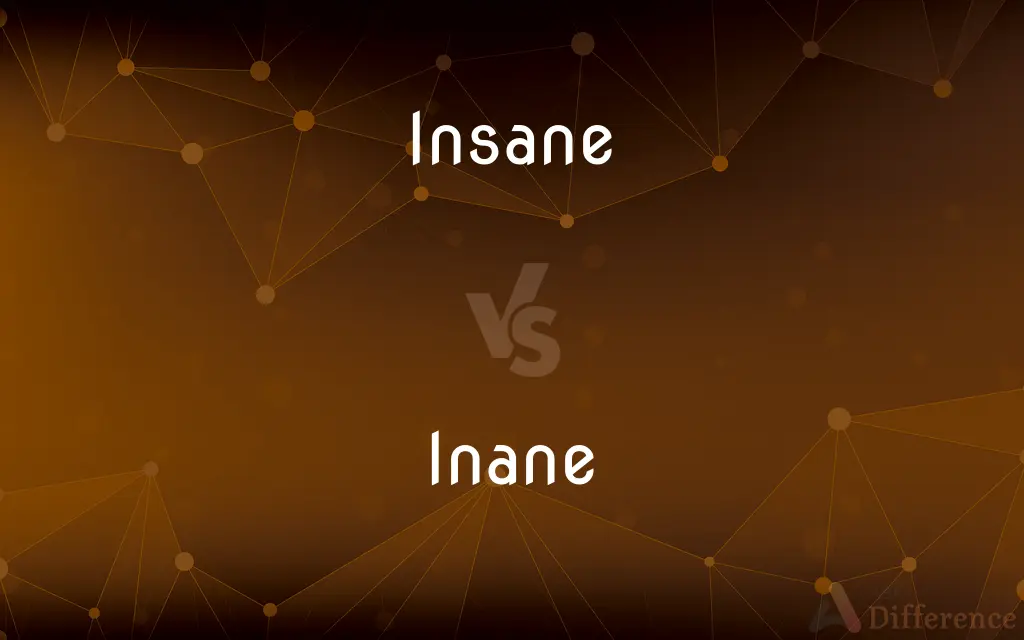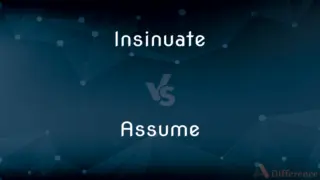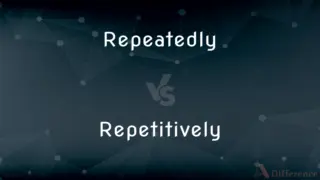Insane vs. Inane — What's the Difference?
Edited by Tayyaba Rehman — By Maham Liaqat — Updated on April 25, 2024
Insane refers to a state of severe mental illness, often lacking contact with reality, whereas inane describes something that is silly or lacking sense or substance.

Difference Between Insane and Inane
Table of Contents
ADVERTISEMENT
Key Differences
Insane typically relates to mental health, indicating conditions that significantly impair cognitive functions and perceptions of reality. On the other hand, inane is not related to health but refers to concepts or behaviors that are senseless or pointless.
An insane action or thought is generally considered serious and can affect one's ability to function normally, whereas inane often implies frivolity or superficiality, lacking depth or importance.
The term insane is often used in legal and medical contexts to describe conditions requiring intervention, while inane is used more colloquially to criticize things as trivial or unimportant.
In popular culture, insane is frequently used to exaggerate challenges or difficulties (e.g., an insane workout), whereas inane is used to dismiss or belittle things that are not taken seriously (e.g., inane comments).
In historical terms, insane has a loaded and sometimes controversial background, associated with asylums and mental health stigma, whereas inane has always maintained a lighter, less critical connotation.
ADVERTISEMENT
Comparison Chart
Definition
Relating to severe mental illness or insanity.
Lacking sense, significance, or ideas; silly.
Usage in Context
Often medical or legal.
Generally informal and colloquial.
Connotation
Serious, potentially dangerous.
Light-hearted, trivial.
Common Phrases
"Pleaded insane", "insane asylum".
"Inane comment", "inane chatter".
Impact on Actions
Can impair daily functioning.
Mainly affects perception of substance.
Compare with Definitions
Insane
Extremely foolish.
It was an insane idea to go hiking during a storm.
Inane
Void of intelligence.
He dismissed the criticism as inane.
Insane
Affected by mental illness.
He was declared insane by the medical board.
Inane
Silly or stupid.
That was an inane way to handle serious negotiations.
Insane
In a state of mind that prevents normal perception.
The tragedy drove her to become insane.
Inane
Lacking sense or meaning.
The film was filled with inane dialogue.
Insane
Shockingly impractical.
They attempted an insane rescue operation.
Inane
Fatuously dull.
She made some inane remarks during the meeting.
Insane
Characterized by extreme intensity.
The game reached an insane level of difficulty.
Inane
Unnecessarily complicated yet pointless.
The rules were inane and confusing.
Insane
Of, exhibiting, or afflicted with mental derangement. Not used in psychiatric diagnosis.
Inane
Lacking sense or substance
Interrupting with inane comments.
Angry with my inane roommate.
Insane
Characteristic of or associated with persons who are mentally deranged
An insane laugh.
Insane babbling.
Inane
Lacking sense or meaning (often to the point of boredom or annoyance)
This supremely gifted kid told me that in the early elementary grades, the songs sung in music class were so inane that he wanted to skip grades already! Eventually he did, so better late than never.
Insane
Intended for use by such persons
An insane asylum.
Inane
Purposeless; pointless
Insane
Having been determined to be in a condition that meets the legal definition of insanity.
Inane
That which is void or empty.
Insane
Immoderate; wild
Insane jealousy.
Inane
Without contents; empty; void of sense or intelligence; purposeless; pointless; characterless; useless.
Insane
Very foolish; absurd
Took insane risks behind the wheel.
Inane
That which is void or empty.
The undistinguishable inane of infinite space.
Insane
Exhibiting unsoundness or disorder of mind; not sane; utterly mad.
Inane
Complacently or inanely foolish
Insane
Used by or relating to insane people.
An insane hospital
An insane asylum
Insane
Causing insanity or madness.
Insane
(informal) Characterized by insanity or the utmost folly; ridiculous; impractical.
An insane plan
An insane amount of money
Insane
(slang) Extremely good; incredibly amazing.
That guy is insane at FPS games.
Insane
Exhibiting unsoundness or disorder of mind; not sane; mad; deranged in mind; delirious; distracted. See Insanity, 2.
Insane
Used by, or appropriated to, insane persons; as, an insane hospital.
Insane
Causing insanity or madness.
Or have we eaten on the insanerootThat takes the reason prisoner ?
Insane
Characterized by insanity or the utmost folly; chimerical; unpractical; as, an insane plan, attempt, etc.
I know not which was the insane measure.
Insane
Afflicted with or characteristic of mental derangement;
Was declared insane
Insane laughter
Insane
Very foolish;
Harebrained ideas
Took insane risks behind the wheel
A completely mad scheme to build a bridge between two mountains
Common Curiosities
Can inane be used in formal writing?
While it's generally seen as informal, inane can be used in formal writing to criticize something as trivial or pointless, though alternatives may be preferred for clarity.
Is there a clinical diagnosis for insanity?
No, "insanity" is not a clinical term in modern psychiatry; it is more commonly used in legal and colloquial contexts rather than in medical diagnoses.
Does the use of inane always imply negativity?
Primarily, yes, as it suggests something is pointless or lacking in substance, but it can sometimes be used humorously.
What are the legal implications of being declared insane?
Being declared insane in a legal context can impact criminal responsibility and result in commitment to a mental health facility instead of prison.
Are there synonyms for inane that convey a similar but less harsh criticism?
Yes, terms like "silly", "vapid", or "vacuous" can convey similar meanings without strong negativity.
What might be a real-life example where the term insane is used metaphorically?
In sports or entertainment, performances or actions might be described as "insane" to denote their extraordinary nature or difficulty.
How has the perception of the term insane changed over time?
Historically associated with stigmatization of mental illness, the term is increasingly avoided in professional settings due to its pejorative connotations.
What is a common misunderstanding about the term inane?
People might confuse it with insane, but inane strictly deals with silliness or pointlessness, not mental health.
What is the origin of the term insane?
The term originates from the Latin "insanus", meaning unsound or unhealthy, particularly referring to mental health.
Could inane ever be considered a compliment?
It is unlikely as its primary connotation is negative, though it could be used playfully among friends in a light-hearted manner.
In what context might someone use inane to describe technological features?
Inane might be used to criticize technological features that are seen as unnecessary or overly complicated without practical benefit.
Can inane describe actions as well as words?
Yes, actions can also be described as inane, especially if they are considered foolish or pointless.
Is it appropriate to use the term insane to describe extreme weather?
While not technically correct, colloquially, "insane" is often used to describe extreme or highly unusual weather conditions.
What impact does calling someone insane have in social settings?
It can be offensive and stigmatizing, potentially reinforcing negative stereotypes about mental illness.
How does cultural context affect the use of the term insane?
Cultural sensitivity to mental health issues can influence the acceptability of using "insane" in casual conversation or media.
Share Your Discovery

Previous Comparison
Insinuate vs. Assume
Next Comparison
Repeatedly vs. RepetitivelyAuthor Spotlight
Written by
Maham LiaqatEdited by
Tayyaba RehmanTayyaba Rehman is a distinguished writer, currently serving as a primary contributor to askdifference.com. As a researcher in semantics and etymology, Tayyaba's passion for the complexity of languages and their distinctions has found a perfect home on the platform. Tayyaba delves into the intricacies of language, distinguishing between commonly confused words and phrases, thereby providing clarity for readers worldwide.















































